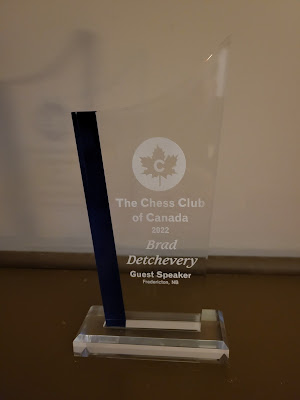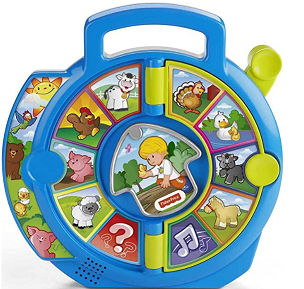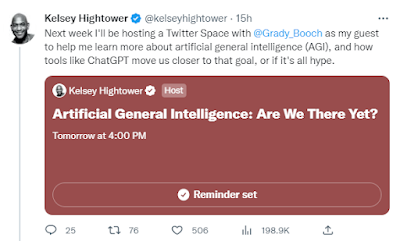Chess, Leadership and the Imagination
On Saturday Dec 3rd, 2022, I was asked to be a keynote speaker at a local chess tournament for ages 14 and under , and I was very honored and excited for this opportunity.
They then further honored me with this trophy at the end and I am again humbled.
Below is a written version of my speech "Chess, Leadership and the Imagination"
The first thing I want to do today, is test if everyone's hands and arms are working.
If you like to play chess, can I please see you raise you hand up high, and please keep it in the air
[Pause]
Okay, second question, if you think chess is an EASY game to play, please keep your hand up high, if you think CHESS is HARD please put your hand down
Okay.. [Pause]
Last question - Think back to the very first time you played chess, maybe it was last week, last month, or 3 years ago, try to remember that first game, maybe it's that first person showing you the rules, the way the difference pieces moved, the first 'real' game you played? - Was that first time learning about chess HARD? If you found chess hard at first to learn, please put your hand down.
Thanks-everyone - You can put your arms down now.
I would not consider myself a good chess player. I know the rules, but I am willing to bet any of you could probably chess mate me within 5 minutes pretty easily.
So let me ask you experts - What sort of things should I do if I wanted to be a better Chess player ?
Anyone?
PRACTICE
This reminds me of an old joke. A person is walking through New York City, he seems very confused and rushed. Oh Dear, he is late - when he see's another person walking down the street with a violin in his hand - so he asks Excuse me but could you tell me how to get to the world famous musical venue - Carnegie Hall. To which the person smiles, tips their hat and replies 'PRACTICE - PRACTICE - PRATICE"
You here today are already LEADERS - and one of the important reasons for it is you CHOOSE to practice CHESS. It's not something the school 'makes' you do. You put in the effort, everyday, and with that effort you reap the rewards. Each time you choose to take some of your times to hone your skill - you move closer to 'EXCELLENCE'.
Okay, so is it just practice? I just keep playing and I will be expert anything else?
ANTCIPATING MOVES / STRATEDGY
When I was about your age, I received some advice from a teacher. The teacher told me "You have a great imagination Brad! - Too many of us as adults loose our imagination - whatever you do don't loose your IMAGINATION. So I tried practicing, so that I would not 'LOOSE MY IMAGINATION"
What I learned, is that imagination is preformed by ADULTS all the time, only they have a different word for it then 'IMAGINATION' - Can anyone think of what that word might be ?
…. VISION …
In the world of 'business' - people have to have a VISION. A clear picture in their minds (using their imagination of where they want to go, what they want to be). Without VISION - If you don't know where your going - How will you know when you got there?
What if I told you that everything in the world that has been invented / created was actually CREATED TWICE! The chess board, the game, the pieces, the rules. This building we are in, the streets you take to get to your house - yes even you house was created TWICE.
First - it was created in someone's MIND - It was an IDEA, it came from someone's IMAGINATION,
Second it was created in REALITY - by following the ideas, the MOVES, a specific strategy to get from just in the MIND into the world of REALITY!
Okay - so where does that leave us ?
Leaders need to be good at PRACTICE, to work and strive for EXCELLENCE
Leaders need to be good at ANTCIPATING MOVES, using their IMAGINATION "vision" and strategy.
What might be a 3rd thing that makes a person good at chess?
Any ideas ?
KNOW YOUR OPONENT (SOCIAL)
Chess is a set of strict rules, we can create computers that are very good at playing CHESS, some of which have even won against grandmasters and world champions alike. So it would be easy to argue that you don't need to be good at SOCIAL things to be good at chess, and this is true so long as you only play against machines - but in the real world, we don't play against machines we play against other HUMANS, who unlike machines, get emotional, get tired, get confused and make mistakes.
Computers can think millions of moves ahead in fractions of a second and always pick the 'perfect' move based on any state of the chess board - but people make guesses. They imagine their move, and their opponents moves, they make guesses, and sometimes they even try to 'psych' the other player out. The machine can't do this but you can.
Have you ever won a game, because you recognized your opponents mistake? And played to that mistake, or perhaps made a move to mis-direct your opponent, try to make them think one thing, while secretly you had other plans.
Leadership too - is a social game, interacting with other people, creating relationships, to build on your mistakes, either together or adversarial.
We have 2 types of 'games' in life. Games like CHESS are FINITE, they have a specific set of rules, the game involves multiple turns back and forth, someone in the end is the WINNER and someone is the LOOSER. The goal of the game is to WIN.
But there is another type of game too - called an infinite game. In an infinite game, the rules are not very strict, and sometimes can change mid game, you have to figure out he rules as you go, and there is no clear WINNER or LOOSER. The goal of an infinite game is not to WIN - but to do everything possible to keep the game from ENDING.
The next time you play chess, give this a try - instead of trying to WIN the game, play with the idea of how can I keep the game going for as long as POSSIBLE instead? - Think about the moves you make - would they be very different then playing to WIN? I bet they would!!
One of the key social aspects when LEADING is to know what type of game your opponent is playing? Are they playing to WIN? (finite game) or are they playing to keep the game going as long as possible (INFINITE) game. Match your strategy to that of your opponent - make sure you are playing the RIGHT game!
So in Summary -
Chess teaches you to PRATICE, on a regular basis, try and try again, make mistakes and learn from them, improve, strive for EXCELLENCE. This is the same skill a leader uses to lead themselves to hone their craft, to make them the best 'X' whatever that 'X' might be.
Chess teaches you to THINK AHEAD and use your IMAGINATION. Leaders need to do this to, to understand the world around them, to vision a different future, and to share that vision with others.
Chess teaches you to be SOCIAL - You can't get ANYONE on your own, we live in a world of interconnecting things, people who help you along the way. This very competition provides you with interaction with all sorts of different people all aroudn the shared idea of CHESS.
As you build your skill within chess, you are also building your skills within LEADERSHIP - You just may not have thought of yet!
So congratulations to this tournament, to the parents and guardians that helped install a joy of chess and helping build our future leaders of tomorrow - Thank- you!









Comments
Post a Comment